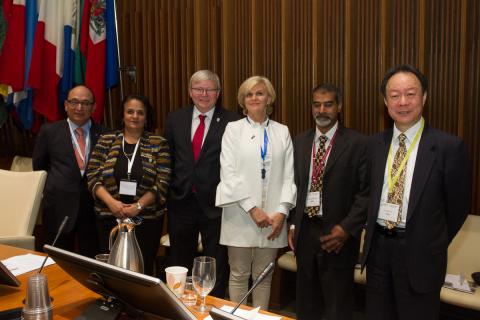
The 2017 Sanitation and Water for All (SWA) High-level Meetings took place in Washington D.C., USA on the 19 and 20 April 2017. These included a Finance Ministers’ Meeting (FMM), convened by the World Bank on behalf of the SWA partnership, and a Sector Ministers’ Meeting (SMM) convened by UNICEF, involving those ministers responsible for water, sanitation and hygiene who have accompanied their finance counterparts.
Rakesh Nangia, the AfDB Evaluator General, made a speech at the Sector Ministers’ Meeting, on the State of Development Effectiveness in the WASH sector in Africa. Mr Nangia outlined the AfDB's strategic plan to include water in a holistic development plan for the continent.
He said that 2016 had marked the highest AfDB financing levels for both rural and urban water supply and sanitation. Fourteen projects worth a record USD 1.2 billion. were approved, representing 11% of the Bank’s total lending for the year. The largest ongoing program is the Sustainable Water Supply and Wastewater Management Program in Kenya, the biggest water investment project, by volume, in the Bank’s 50+ year history. On completion, the Project will provide more than 2.1 million people with reliable and sustainable water supply services; provide more than 1.3 million people with functioning sewerage systems; and, create more than 15,000 new jobs during and after construction, with a focus on women and the youth.
He presented the IDEV desk review of evaluation reports of eighteen AfDB-funded WASH projects, completed between 2010 and 2012 and of the evaluation results of other development partners involved in WSS in Africa. “Water Supply and Sanitation in Africa - Findings, Lessons and Good Practices to Improve Delivery” highlights emerging good practices and innovations and reflects on the key lessons of successful and failed cases. The findings encourage government ministers and officials, managers of utilities and water authorities, consultants and development partners to consider creative and holistic solutions to water and sanitation challenges, based on capacity development and sustainable models of integrated development.
He also presented the 2 impact evaluations of WASH programs in Ethiopia and Tanzania carried out by IDEV. These provide credible information on results and offer lessons and recommendations to their Governments, to Bank management (including the Water and Sanitation Department) and to DPs for sustaining benefits, and for informing the design and implementation of future programs. One of the key findings of the evaluations is that effective capacity building is a key factor for success. Similarly, efforts at institutional capacity building at all governmental levels and clear performance contracts between local and central government departments are instrumental. The technical capacity of project partners was also highlighted as an area requiring attention.
Moving forward, Mr. Nangia affirmed that the Bank will increasingly increase financing to the sector by leveraging more resources through co-financing, climate funds, public private partnerships and other innovative financing mechanisms. The Bank will also support the identification and scaling up of approaches that lead to more sustainable and affordable infrastructure, water-efficient service provision, and multi-purpose infrastructure investments.
Participants at the event had the opportunity to engage in policy debate, exchange lessons learned and hold each other mutually accountable for progress on improving access to sanitation and drinking water for all.

